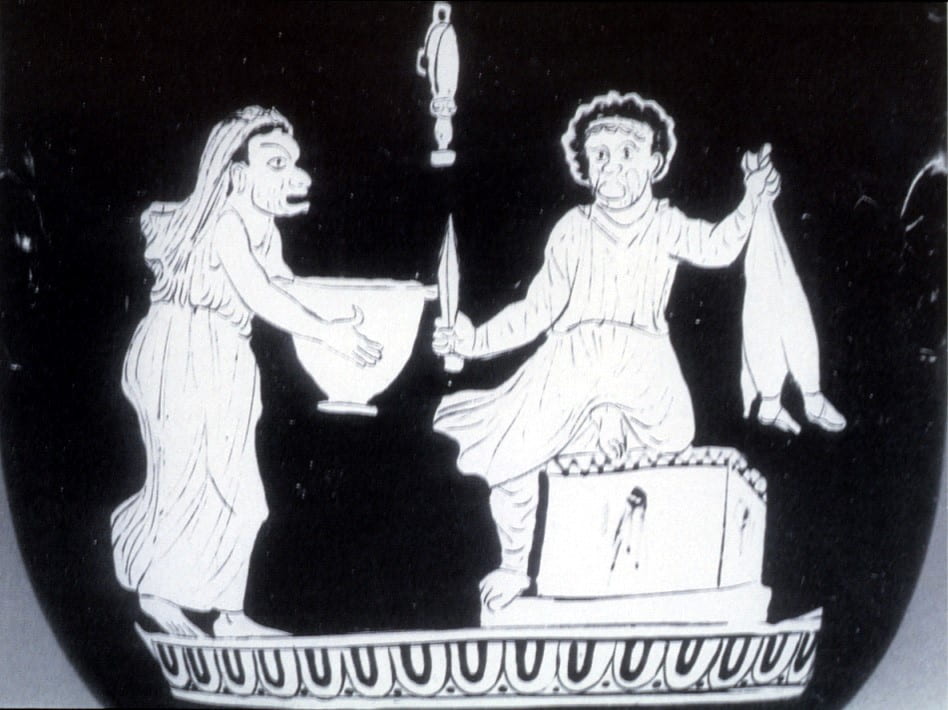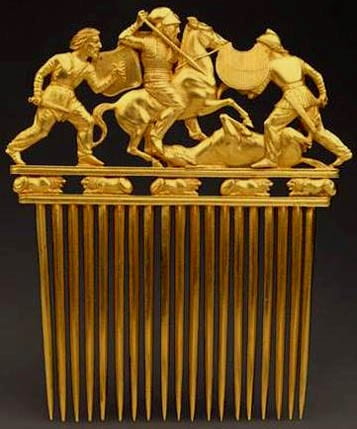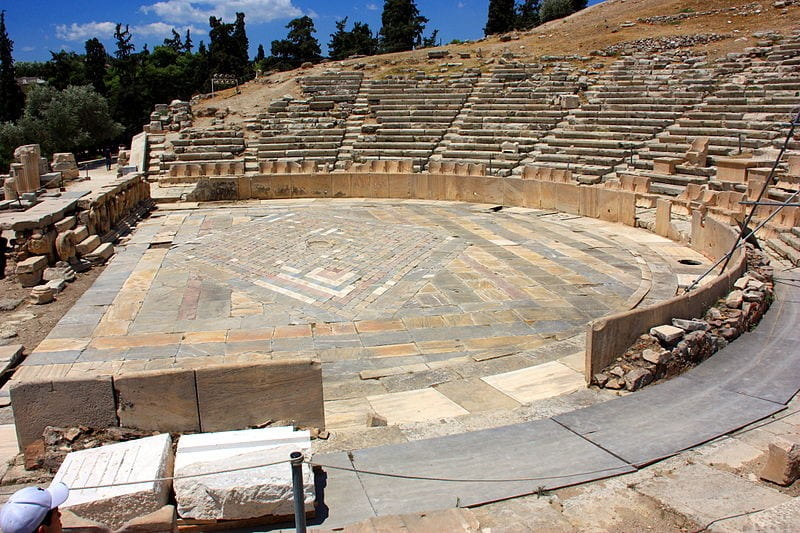by Contributing Writer Lucy Valsamidis
Athens was doing badly in the war against Sparta. The fleet had been devastated in Sicily, and morale and cash were running low. When Peisander appeared in the assembly and explained the only way to win was to suspend the democracy for a while – to “have a more moderate form of government” – so they could ask for help from their old enemies the Persians, the Athenians were dubious. They reluctantly agreed to let Peisander try negotiating, but wouldn’t budge on the democracy point. Peisander sailed away – but secretly urged groups sympathetic to oligarchy to undermine the democracy in any way they could. Some time later, the prominent popular politician Androcles was assassinated.
This, according to Thucydides (8.53-54, 65), was what was happening in the spring of 411BC, when (probably) Aristophanes put on his Women at the Thesmophoria at the Dionysia festival (Sommerstein 1977). The play – unlike his Lysistrata, put on just a few months before – hasn’t traditionally been seen as political. It’s even been suggested that Aristophanes was so alarmed by developments that he chose not to put on an overtly political play. Explicit comment on impending oligarchy is certainly limited in the Thesmo. But the Thesmo. is a play preoccupied with political language and its breakdown. What I’d like to argue here is that in tracking the collapse of political language into nonsense and violence Aristophanes just might have been saying something about contemporary politics too.
It’ll be useful to start off with an overview of the plot. The tragedian Euripides discovers that the women of Athens are going to seize the opportunity of a women-only festival, the Thesmophoria, to stage a political assembly and plot to murder him, because he’s given them a bad name by putting characters like Phaedra on stage. Alarmed, Euripides gets an unnamed relative of his to go along in disguise to talk them out of it. When the women discover him, they bring on a Scythian guard to detain him. The rest of the play is taken up with Euripides’ increasingly absurd attempts to rescue the Relative with skits from his own plays. Eventually Euripides succeeds, the women agree not to murder him if he stops misrepresenting them on stage and all ends happily.

A fourth-century South Italian vase thought to show a scene from the Thesmophoriazusae: the Relative (right) faces off against one of the women. Würzburg, Martin von Wagner Museum.
So far, so meta-theatrical, and plenty of valuable work has been done on the play’s treatment of theatre and gender (see especially Zeitlin 1981). But the men who played the women at the Thesmophoria were like all performers of Athenian drama also members of the democratic assembly, performing before an audience of thousands of (mostly) their fellow citizens. The assembly scene is, in this sense, a parody of Athenian politics. Getting up to speak for the plan to murder Euripides, one of the women claims his lies are outrageous. The rest agree. But when the Relative replies that women really do cheat on their husbands so they can’t complain, the women are equally impressed:
Relative: … Don’t we commit these misdeeds? By Artemis, we do! And then do we get mad at Euripides, though he’s done nothing worse to us than what we’ve done ourselves?
Chorus: This is really astonishing! … I wouldn’t have thought the wicked woman would ever have had the nerve to say these things so brazenly right before our eyes: now I guess anything is possible …
Chorus leader: No, there’s nothing worse in every way than women born shameless – except for the rest of women! (502-32, with omissions)
Thucydides evokes such moments when, in the Mytilenean Debate, he has Cleon criticise the Athenians for being “the easy victims of newfangled arguments [kainotetos logou]” and “slaves to every new paradox” (3.38). It’s significant that we start seeing discussion of clever argumentation of this sort towards the end of the fifth century, around the same time that the philosopher Gorgias floated the idea that it was impossible to convey reality in logos. Suddenly, the implication was, you could argue for anything at all. In fact, Euripides was especially famous for having his characters do this: the Nurse in his Hippolytus, for instance, presents Phaedra with an elaborate justification for adultery (433ff).
Suspicion could attach not only to the content of a political speech but the authenticity of the speaker: Diodotus, Cleon’s opponent in the Mytilenean debate, attacks the Athenians for hesitating to support politicians they agree with for fear they have taken bribes (3.41). Authenticity was apparently felt to be a particularly acute problem in 411. Thucydides tells us that one of the masterminds behind the oligarchical plot was a clever man named Antiphon, who became an object of popular suspicion because he never appeared in the assembly himself but got others to make speeches on his behalf (8.68). So it’s interesting that when the women discover that Euripides’ Relative is not all he seems – not speaking up for himself but Euripides, and not even a woman at all but a man – they quickly abandon their political assembly. Although the women do make political comments later in the play, it’s never as a constituent assembly and never as part of a debate. As the women start seeing through the Relative’s deceptions, then, they also lose their interest in political persuasion.
The women have to make sure that Euripides won’t be able to snatch the Relative from under their noses. So they bring in a guard who is incapable of any sort of persuasion. The Scythian guard is one of the most spectacularly racist caricatures in all fifth century literature. He ties up Euripides’ Relative and threatens him with rape, and is capable of speaking only short sentences of broken Greek (1002ff). The first character Euripides brings on to try to rescue the Relative is Echo, a character from his recent (though now lost) Andromeda. Echo doesn’t bother trying to persuade the Scythian that the Relative is really Andromeda chained to the rocks and in need of rescuing. Instead, while the Scythian is distracted Echo gets the Relative to play along as Andromeda in a duet, parroting the end of each of his lines. The Relative loses his patience, but that just makes her echoes all the more insistent:
Relative: You’re killing me, old hag, with your jabbering!
Echo: Jabbering! (1074)
When the Scythian notices the noise they’re making, Echo flees, parroting each of his yells back at him (1082ff).

Scythians as they saw themselves: this comb was made around the same time the play was first performed. St Petersburg, State Hermitage Museum.
The failure of the Echo ploy, and then of Euripides’ attempt to appear as Andromeda’s saviour Perseus (1098ff), makes Euripides realise he’ll have to try something new again:
Ah me, what action, what clever logic now?
All wit is lost upon this savage lout.
For work a novel ruse (kaina sopha) upon a clod
and you have worked in vain … (1128-31)
So, for his final trick, Euripides doesn’t bring on any characters from his plays at all. Instead, he disguises himself as a pimp and brings a girl, Elaphion, with him on stage (1160ff). It doesn’t prove difficult to persuade the Scythian to pay to spend some time with the – totally wordless – Elaphion, leaving Euripides alone with the Relative and giving them the chance to escape.
Over the course of the play, then, the elaborate political deceptions of the women’s assembly and theatrical deceptions of Euripides’ characters collapse into nonsense and violence. On one level, all this justifies the exclusion of women and non-Athenians from politics. The women’s attempts to plot against Euripides lead to the corporal punishment without trial of an Athenian by a foreign slave. But if we recall that all the characters in the play were played by male Athenian citizens, a different interpretation is possible too. In his analysis of the violent conflict between proponents of oligarchy and democracy on Corcyra (modern Corfu), Thucydides claimed that “words had to change their ordinary meaning and to take that which was now given them” (3.82). Describing the growing mistrust between the citizens of Corcyra, he claims that
the inferior in intellect were most successful. Apprehensive of their own deficiencies and the cleverness of their antagonists, they feared to be worsted in debate … and so boldly had recourse to action. (3.83)
Thucydides was an Athenian, and his analysis of the Corcyraean civil war prefigures his later, more detailed account of the oligarchic coup in Athens. In this light, it’s tempting to think Aristophanes might have used the play between sophistication and stupidity in the Thesmo. to reflect on the breakdown of political debate in the spring of 411. On this view, the assembly of women lose their faith in politics when they realise that the speakers are inauthentic and that there is no relation between their words and reality. Trusting only the unpersuadable Scythian and abandoning political debate themselves, they watch as Echo and the Scythian break the most essential link between words and meaning – basic comprehensibility – as the Relative is tied up and clever Euripides is reduced to tricking the Scythian with the promise of sex.
All this would have been rather more subtle than Aristophanes’ normal mud-slinging at particular politicians and policies. Even in Thesmo., the Chorus – once it forgets about its own claims to political authority – lampoons a few real politicians by name (785ff): one of these, in fact, would be killed by another in the civil conflict later the same year (Thuc. 8.73.3). But perhaps the political problems of 411 demanded a different approach. By using the women’s assembly at the Thesmophoria to comment on Athenian politics, Aristophanes could draw attention to the dangers both of disingenuous political language and of the breakdown of that political language. Importantly, he could also fairly claim that the play wasn’t about politics at all.
If Aristophanes did mean to reflect on the issues of the day, that doesn’t necessarily tell us where he stood on them. In one sense, the Scythian’s acceptance of Euripides’ promise might have reminded the Athenians of their own collective willingness to be duped by promises, of Persian cash or anything else. On this view, the Scythian’s lust for Elaphion is a nasty twist on the comic trope of the Athenian hero getting the girl at the end of the play, or even a reminder of the trope of the voting public’s greed for handouts. On the other hand, the dangerously stupid Scythian might just as well have reminded some of the oligarchic assassins: after all, Thucydides doesn’t specify in his analysis of the Corcyrean crisis whether the oligarchs or the democrats were more likely to be “inferior in intellect”, and by his account the oligarchs were the ones who resorted to violence in 411. Interpretations of this sort along several different lines are possible. Perhaps, then, rather than pushing a partisan line Aristophanes wanted Athenians of democratic and oligarchic persuasions alike to use the Thesmo to think about their approaches to public discourse – and, as a poet who lived off that discourse, to draw attention to its value. Put differently, by projecting the political failings of the men of Athens onto the women at the Thesmophoria and the Scythian, he could invite his audience to turn their derision for each other onto the disenfranchised.

The Theatre of Dionysus in Athens.
The year 411 wasn’t the end of democracy in Athens. In June – in an atmosphere, Thucydides suggests, of profound mistrust (8.66) – the assembly voted to install an oligarchical government of Four Hundred, but it proved short-lived. The opponents of the Four Hundred stockpiled arms and gathered in the theatre at Piraeus before going to speak with representatives of the oligarchs (8.93). But the distinctions between political violence and the democratic process were never really clear cut. Two years later, an inscription tells us (Wilson 2009), in the Theatre of Dionysus before the opening of the tragedy competition, a crown was awarded to Thrasybulus of Calydon – a non-citizen – for assassinating the oligarch Phrynichus and, in so doing, defending the democracy from harm.
Lucy Valsamidis studied Classics at the University of Oxford (2013-17), where she was a scholar at Merton College. Translations, sometimes adapted, are taken from Strassler’s edition of Crawley’s Thucydides (1996) and Sommerstein’s Aristophanes Loeb (2000).



Leave a Reply